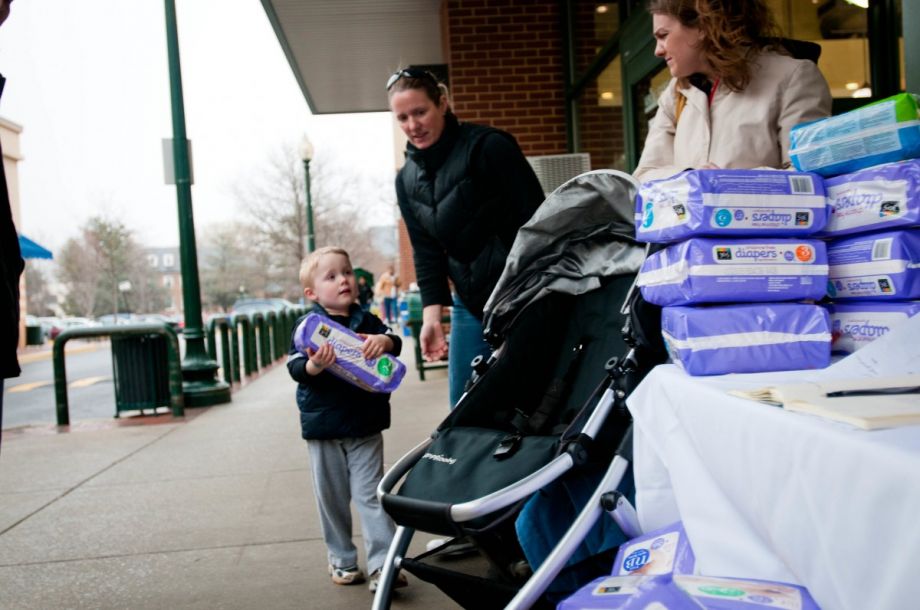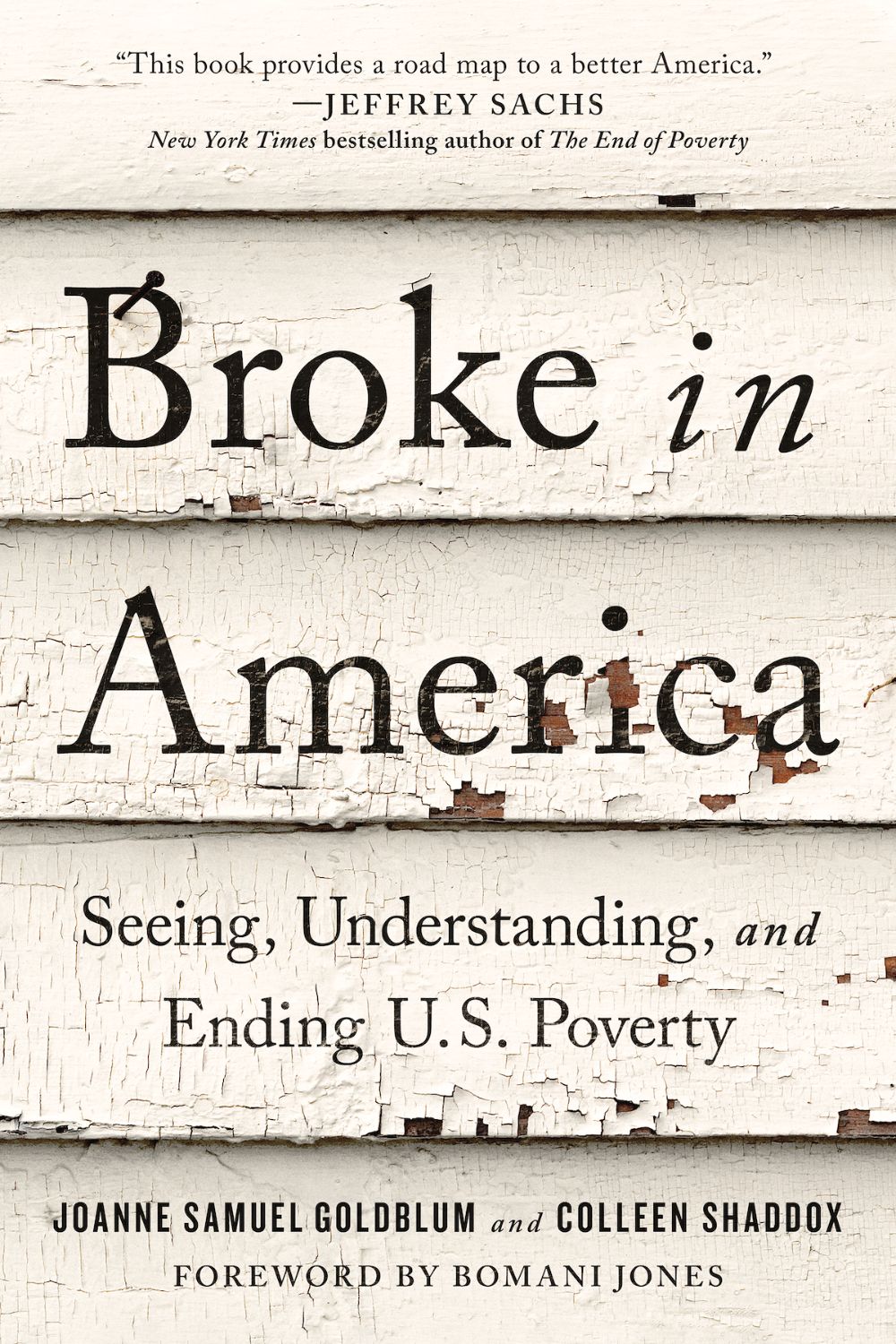
A diaper drive in suburban Maryland (Photo by Joe Foley / CC BY-ND 2.0)
Editor’s note: This is an excerpt from Broke in America, by Joanne Goldblum and Colleen Shaddox, published by BenBella Books. In the book, Goldblum and Shaddox offer an eye-opening and galvanizing look at life in poverty in this country: how circumstances and public policy conspire to keep people poor, and the concrete steps we can take to end poverty for good. Every chapter features action items readers can use to combat poverty—both nationwide and in our local communities, including the most effective public policies you can support and how to work hand-in-hand with representatives to affect change. In this excerpt, Goldblum describes how she was inspired first to found a local diaper bank in Connecticut, and then to launch the National Diaper Bank Network.
I was working with families who had been chronically homeless through my job as a social worker at the Yale Child Study Center.
The genesis for my career change—and this book—came when I saw an intellectually disabled mother of two reusing a disposable diaper that had been left out to dry. I explained to her that using a fresh diaper every time was essential for her baby’s health. She told me that she could not afford diapers or toilet paper. The family was sharing a cloth towel to clean up after using the toilet.
 I made an assumption—never a good idea. I assumed she did not understand the sources of help out there for her. I thought, surely, she could use her food stamps to buy these products or that she could get them from WIC. Wrong and wrong. If you want diapers in the United States, you’d best have cash—or even better, a credit card so that you can shop online and get the best deals. People without transportation or sufficient cash tend to buy diapers in small quantities at corner stores, where they are significantly more expensive.
I made an assumption—never a good idea. I assumed she did not understand the sources of help out there for her. I thought, surely, she could use her food stamps to buy these products or that she could get them from WIC. Wrong and wrong. If you want diapers in the United States, you’d best have cash—or even better, a credit card so that you can shop online and get the best deals. People without transportation or sufficient cash tend to buy diapers in small quantities at corner stores, where they are significantly more expensive.
My client was enrolled in a job-training program, which she had to attend in order to get TANF, the cash assistance that (barely) supported her family. She had access to subsidized childcare so that she could attend the training. But her provider, like most, required that she supply disposable diapers as a condition of the baby attending.
Because she could not afford diapers, she was subject to a domino effect. No diapers equals no childcare equals no work or school. And of course, there are the rashes, and sometimes more serious infections, that come with too few diaper changes, the fussiness, the crying, the feeling of failure because you cannot meet your child’s most basic needs. I ended up buying diapers for the family out of my own pocket, a frequent strategy for social workers when they realize that there is no official channel prepared to give a client what they need. But I would not be her social worker forever. Plus, I knew that there would be millions of families around the country in exactly the same situation. What about them?
I started looking into hygiene supplies, what they cost and what help there was for families who could not afford them. It was nearly impossible for people short on money to get these essential products. We talked about it a lot as a family, and in 2004 we decided to just get started. That meant going to the warehouse club, the cheapest place to buy diapers, and loading up our minivan with cases of them. We got close friends to do the same. The diapers ended up at our house. I added another line to our family cell phone plan, and that became the virtual headquarters of the Diaper Bank.
Early on, I decided that the Diaper Bank would not have a physical presence where it handed out diapers. Even though its successor, the Diaper Bank of Connecticut, has a large warehouse space and office, this is still true. I knew that there were agencies throughout my community that already served poor and low-income families with young children. I partnered with them for a few reasons:
- It got us going faster— with less need for our own infrastructure.
- It allowed us to reach into corners of the community where our core group did not have connections.
- We were able to support, rather than compete with, nonprofits already doing important work.
Our diaper buyers and drivers became board members. We held diaper drives, raised money, and talked with the media about diaper need. Though I was living a diaper-centric life, it was never solely about diapers. I realized that the need for tampons, toothpaste, laundry detergent, and many other hygiene and household supplies was also urgent. But I chose to do one thing, and do it well, I hope, rather than split my focus.
Choosing diapers was designed to raise public support and also maximize impact. Babies are sympathetic. Yes, I did get calls and letters from people who demonized the parents—actually, almost exclusively the mothers—for “having babies they cannot afford.” But far more people were horrified at the idea of babies spending days in dirty diapers. Those people tended to be thinking of what it would be like for their own children and grandchildren to be in such dire straits. That kind of empathy is what continues to drive the diaper bank movement.
In taking on partner agencies, we built ourselves a base in the community. Nonprofits that people already considered essential considered the Diaper Bank essential. That helped us make connections to people who would give money, diapers, and professional services to help us grow.
Soon we had some paid staff. While the growth was tremendous, we did not grow for the sake of growing. Staff spent most of their time ensuring that we were operating smoothly and providing as many diapers as possible to our partners—not doing marketing. Make no mistake: marketing is critical, but it is often the “fun part” to most people and can suck more energy than it should. Your first job is to build something that is worth marketing.
The Diaper Bank got a lot of attention, as I did personally. When national media covered our work, it created more opportunities. Eventually, a major diaper brand, Huggies, agreed to support me as I started the National Diaper Bank Network (NDBN). Today NDBN has more than two hundred member organizations in communities throughout the country. The national organization gives these local diaper banks access to huge diaper donations as well as technical assistance that helps them become strong and efficient nonprofits able to help their communities for the long haul. NDBN also does policy advocacy on behalf of families in poverty, particularly around hygiene needs. Some of the key players in the diaper bank movement have years of policy experience, advanced degrees, and connections to large organizations. Others have no real preparation for the work but draw on their own experience of poverty, or simply their good hearts, and they set up distribution programs run out of church basements or their own garages. They come from all religious and political persuasions. Together, we’ve given out more than two hundred million diapers since 2011. We recently started the Alliance for Period Supplies to get these essential products to the one in four menstruators who say they’ve had to do without them.
Diaper banking is what this entire book is about: the idea that there are necessities beyond the means of people in poverty and no public programming to help them bridge that gap. Without these necessities, people miss work and school. They get sick. They sink deeper into poverty. We have proved that families who receive free diapers earn more money and have healthier children. Parents report that they and their children are “happier” as a result of the diapers. You can help people work their way out of poverty, just by giving them diapers. By taking away one of the stressors that comes with poverty, you can make a home a much more developmentally healthy place for a baby to grow up. Giving people diapers does not solve everything. But it solves quite a bit.
This post was originally published on Next City.

